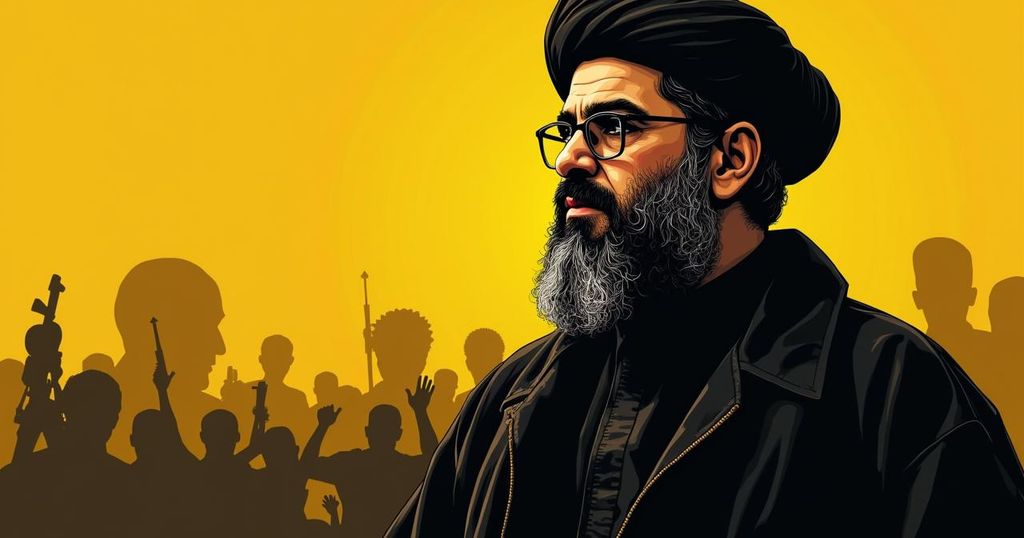Charismatic Leadership and Strategic Resilience: An Overview of Hassan Nasrallah’s Influence in Hezbollah

Hassan Nasrallah has led Hezbollah for nearly three decades, transforming it into a powerful paramilitary group in the Middle East. Under his leadership, Hezbollah has engaged in significant military conflicts with Israel and has played a role in the Syrian civil war. His charismatic leadership has fostered strong support among Lebanese Shiites and extends throughout the Arab and Islamic worlds. Recently targeted by Israeli airstrikes, Nasrallah’s strategic responses and military engagements highlight his pivotal role in ongoing regional conflicts.
Hezbollah leader Hassan Nasrallah has been a dominant figure in Lebanese and Middle Eastern politics for over three decades, transforming Hezbollah from a militia formed in response to Israeli military incursions into a formidable paramilitary force. Under Nasrallah’s leadership, which spans nearly thirty years, Hezbollah gained significant political influence and military prowess, recently retaliating against Israeli airstrikes that targeted its strongholds in Southern Beirut. Born in 1960 in a modest Shiite family, Nasrallah’s early life was marred by displacement amid the tumultuous conditions of the Lebanese civil war. He was educated in theology and initially aligned with the Amal Movement before becoming one of the founding members of Hezbollah, which was established with Iranian support to combat Israeli forces in Lebanon. Following the assassination of Hezbollah’s previous leader in 1992, Hassan Nasrallah was appointed as Secretary-General. Under his command, the organization successfully orchestrated campaigns that forced Israeli withdrawals from Lebanon, earning him acclaim throughout the Arab world. Nasrallah has cultivated an image as a charismatic leader revered by his Shiite constituents and recognized across the broader Islamic community. His strongholds in both religious and military strategies have allowed Hezbollah to maintain its rebellious stance against Israel while also engaging in the Syrian civil war on the side of President Bashar Assad. As pressures mount in the ongoing conflict with Israel, Nasrallah asserts Hezbollah’s decisive role in diversifying military fronts, framing Hezbollah’s actions as crucial in alleviating the Israeli focus on Hamas in Gaza. Despite the controversies surrounding his leadership, including the designation of Hezbollah as a terrorist organization by the United States, Nasrallah’s deft maneuvering and strategic alliances indicate a complex figure who has reshaped the regional landscape.
Hassan Nasrallah has emerged as a pivotal figure within Hezbollah, a Shiite militant group originating in Lebanon during its civil war. Born into a disadvantaged setting, he became integral to Hezbollah’s formation following the Israeli invasion of Lebanon in 1982, with Iranian backing to export its political ideology. Rising through the ranks, he assumed leadership after the assassination of the previous secretary-general, and has since navigated complex geopolitical landscapes, managing relationships with other militant groups. His tenure has been marked by significant confrontations with Israel, most notably the 2000 withdrawal of Israeli forces and the 2006 war, which consolidated his reputation as a potent leader in resistant movements across the Arab world. Presently, with tensions flaring as Hezbollah actively engages against Israel, Nasrallah’s role continues to evolve against a backdrop of changing regional alliances and conflicts.
Hassan Nasrallah’s leadership of Hezbollah encapsulates a significant period in Lebanese and Middle Eastern history, characterized by its emergence as a powerful paramilitary entity fiercely opposing Israel. His strategic acumen has allowed Hezbollah to navigate a multitude of conflicts, notably shaping responses to Israeli provocations. The recent Israeli airstrikes that targeted Hezbollah strongholds raise pressing questions about the ongoing tensions in the region and Nasrallah’s capacity to maintain influence amid an ever-volatile landscape. As he asserts Hezbollah’s role in the larger context of regional conflicts, his leadership continues to draw international scrutiny and influence the dynamics of power within Lebanon and beyond.
Original Source: apnews.com








